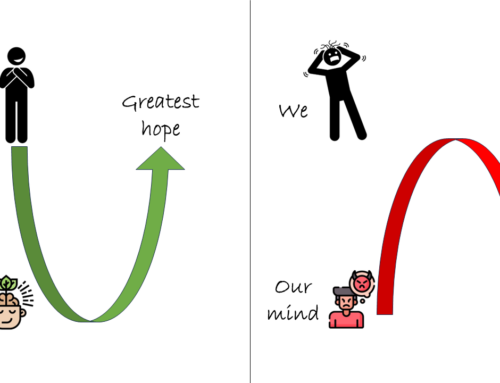
In the Bhagavad-gita’s sixth chapter, Krishna stresses that renunciation of work (06.03-04: shamah) can lead to progress only for those who have situated their mind in equanimity (06.05-09)
Why is mental equanimity a prerequisite for renouncing the world?
Because we are usually protected from our mind’s worst impulses by society: specifically by the expectations and obligations that society places on us. Suppose our mind impels us to use foul language or speak obnoxiously. If we are surrounded by people, their shocked expressions on hearing our words will immediately deter us. Or suppose our mind impels us to lazily stay in bed all day. If we have a family to take care of, that obligation will pull us out of our mind’s lethargy. In general, social norms protect us from pandering disproportionately to our mind’s extreme moods.
Of course, these same social norms may prevent us from focusing exclusively on spiritual growth. That’s why those who want that single-pointed spiritual focus may aspire to renounce the world. While renunciation is included in many paths and it takes on many forms, Krishna is here discussing the form of renunciation that is conventional on the path of dhyana-yoga: solitary meditation in a secluded place in a forest, far removed from human society. Because such yogis meditate alone, they have to constantly confront their inner companion: their mind. If the mind is wild, it can distract them endlessly, even deviate them limitlessly. Srimad-Bhagavatam warns that such people are in the forest with six spouses: their six senses headed by their mind (5.1.17). The Gita warns that such people may end up becoming hypocrites: despite being externally separated from worldly objects, they may still be internally fixated on those objects (03.06). That’s why external renunciation alone doesn’t bring about internal focus — it can help them focus only when their mind is no longer captivated by worldly things.
In the Gita’s battlefield context, Krishna conveys to Arjuna that renouncing the world is no shortcut to liberation; he needs to honestly assess the level of his mind, thereby taking responsibility to elevate himself with it, not degrade himself (06.05).
One-sentence summary:
Only when we have situated our mind in equanimity can external renunciation help our spiritual growth; otherwise, external renunciation will only increase our vulnerability to our mind’s lower impulses.
Think it over:
- How does society protect us from our mind’s impulses?
- How may external renunciation increase our vulnerability to our mind?
- How and when can external renunciation help us grow spiritually?
***
06.05: One must deliver himself with the help of his mind, and not degrade himself. The mind is the friend of the conditioned soul, and his enemy as well.
To know more about this verse, please click on the image











Leave A Comment